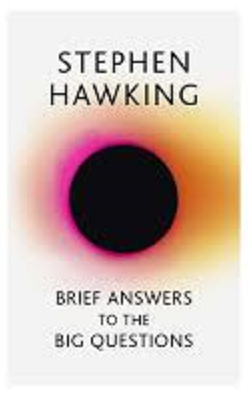Last Updated on July 16, 2019

Resident Ralph Strong will review Brief Answers to The Big Questions by Stephen Hawking, on Tuesday, August 20, 2019 at 7 PM in the Auditorium.
This final book by Stephen Hawking was published a few months after his death in March 2018. The author attempts to answer some of the big questions in cosmology, philosophy and human awareness. In the process, Hawking weaves interesting details of his personal life along with brief descriptions of his technical discoveries, including how he arrived at the realization that black holes can and do lose mass, a phenomenon that has been named ‘Hawking Radiation’ in his honor. His life is so remarkable because he became afflicted with the muscle debilitating disease, Amyotrophic Lateral Sclerosis (ALS}, at the age of 21. Although he was always under the threat of dying within the next five years, he lived to be 76 and built a career as a well-respected mathematician, cosmologist, author and personality, whose life was portrayed in the film “The Theory of Everything.” His most popular book was All About Time, which sold over 25 million copies.
An introduction with details of his personal life is followed by 10 chapters devoted to answering 10 big questions. In our review, we will discuss a few of these answers including “Is there a God?”, “How did it all begin?” and “How do we shape the future?”. Hawking includes thought-provoking ideas on the future of education and how to deal with the rapidly evolving technology, identifying the big questions that we are leaving for the next generation.
A forward written by Kip Thorne, a lifetime friend, a physicist from California Institute of Technology, and an afterward written by his daughter Lucy shed light on his family life and achievements. Hawking remained engaged in his work until he died at the age of 76. For the last years of his life, he communicated and drove his motorized wheelchair by controlling motion of a muscle in his cheek.
Brief Answers to the Big Questions is thought- provoking and provides a non-mathematical walk through the life of a remarkable man, the history of science and challenging concepts in education and social relations.
Janet Neer and Jane Backstrom, Co-chairs
